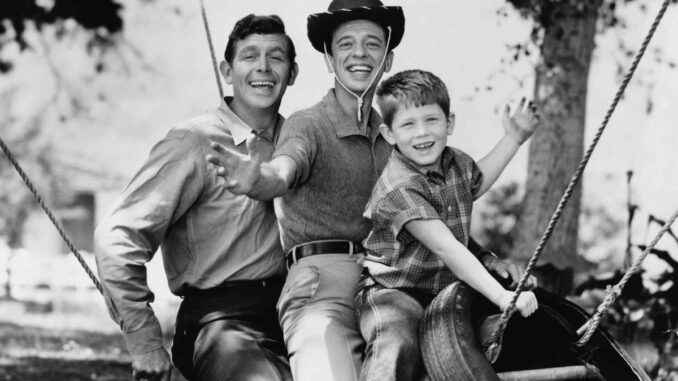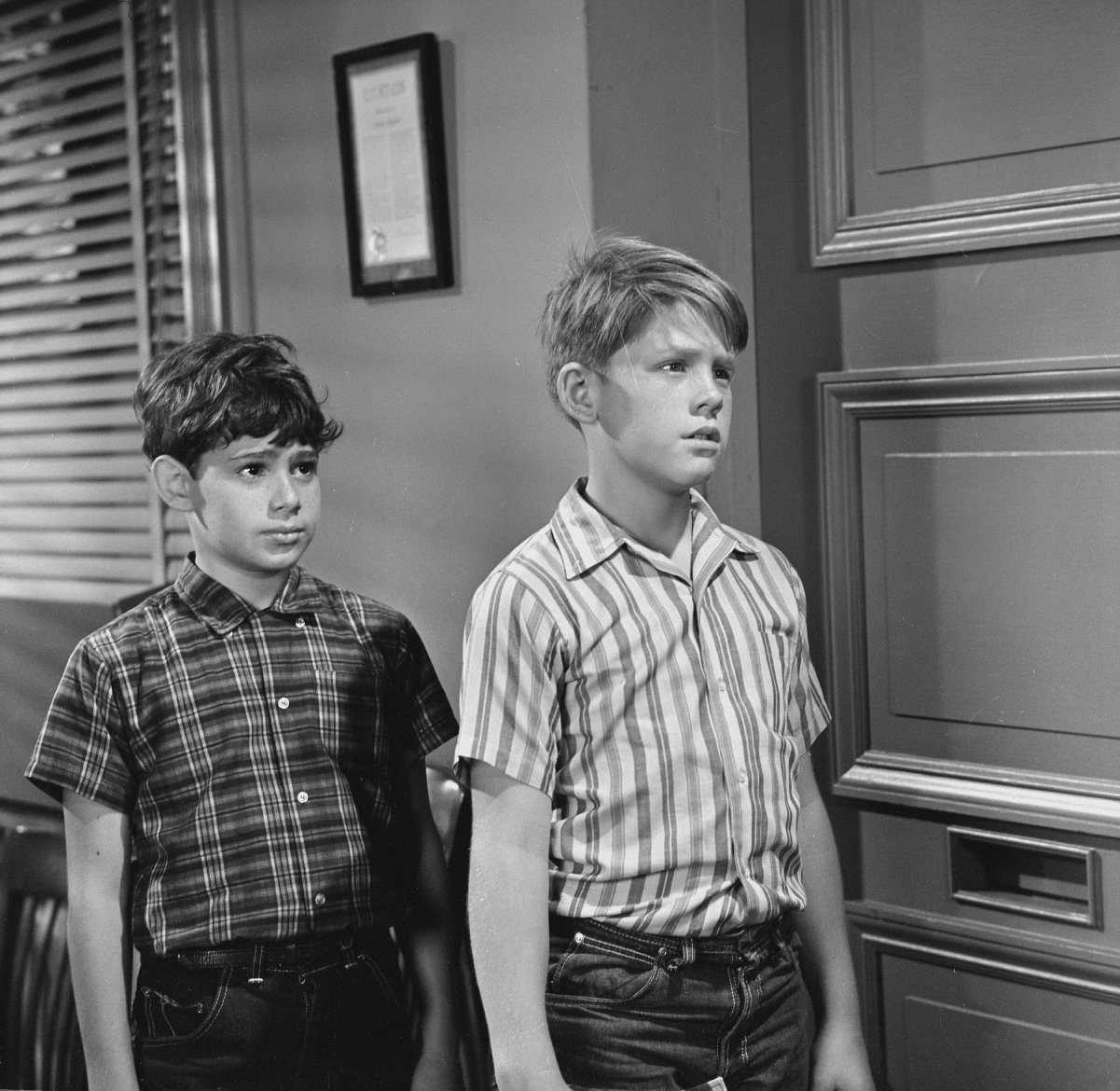
Introduction: A Bond Beyond the Screen
When we think of The Andy Griffith Show, most of us remember its easy charm, southern hospitality, and the timeless father-son relationship between Sheriff Andy Taylor and little Opie. But behind the scripted lines and black-and-white scenes, a real bond formed—one that left a lifelong mark on a young Ron Howard. This article dives into the most valuable, enduring lesson Howard learned during his eight seasons on the show—and how it still influences him to this day.
Who Is Ron Howard? A Quick Refresher
Before becoming an award-winning director of films like Apollo 13, A Beautiful Mind, and The Da Vinci Code, Ron Howard was best known as Opie Taylor. At just six years old, he stepped onto the set of The Andy Griffith Show, unaware that he was entering what would become the most formative years of his young life.
Andy Griffith: More Than Just a Co-Star
Andy Griffith wasn’t just playing a father figure on screen. Off-screen, he embodied that same quiet strength, compassion, and wisdom. To Ron Howard, he was a mentor, a guide, and—when needed—a second father. Their connection was authentic, and Griffith’s approach to parenting Opie on set was no different from how he mentored Howard behind the scenes.
The ‘Greatest Enduring Lesson’ Ron Howard Took Away
So, what was the lesson that left such a lasting impression on Ron Howard?
It wasn’t about acting techniques or hitting his marks. It wasn’t even about memorizing lines or industry advice. Instead, it was the art of storytelling through honesty—staying grounded in truth, sincerity, and emotion. Griffith taught Howard that the best acting (and by extension, filmmaking) comes from a place of truth.
“Play the Truth”: Andy Griffith’s Quiet Rule
Griffith often reminded Howard, “Don’t act—just be.” He meant it. He encouraged young Ron to forget about performing and instead focus on feeling. It was about being present in the moment, letting emotions guide the dialogue, and connecting with the audience on a human level.
This was storytelling at its purest form—and it became Howard’s compass when he later moved behind the camera.
Life Imitating Art: Lessons in Fatherhood
Ron Howard often speaks about how Andy Taylor’s fathering style on the show mirrored Andy Griffith’s real personality. Calm, rational, and always compassionate. Howard says that the way Andy handled Opie’s little boy problems gave him a blueprint for parenting his own children years later.

Ron Howard’s Directing Style: The Griffith Influence
You can trace Andy Griffith’s influence in many of Howard’s films. Whether it’s the emotional honesty in Parenthood, the ethical dilemmas in Frost/Nixon, or the character-driven tension in Rush, that foundation of truthful storytelling is always there.
Griffith taught him not to manipulate the audience but to respect their intelligence. Let them feel something real.
Child Actor or Just a Kid on Set? Griffith’s Gentle Balance
One of the remarkable things Griffith did was protect Ron Howard from the trappings of child stardom. He didn’t treat Howard like a miniature adult. He treated him like a child who happened to be working on a television set. That balance helped Ron stay grounded—even when fame could’ve gone to his head.
A Safe Space to Learn and Fail
Griffith gave Howard space to make mistakes without judgment. Whether he flubbed a line or missed a cue, there was no scolding. Just gentle correction and encouragement. That created a work environment that felt more like a classroom with no grades—a place where learning was the goal, not perfection.
The Long-Term Impact on Howard’s Confidence
Ron Howard has said multiple times that his confidence as a director stems largely from that early environment. Because he was treated with respect and kindness on set, he learned to trust himself—and later, trust his actors.
Griffith planted the seeds of leadership in a boy who would go on to lead massive film productions.
An Emotional Masterclass Every Week
The show’s scripts weren’t just comedy—they carried emotional weight. When Opie cried, it was real. When Andy offered fatherly advice, it struck chords. Howard was exposed to a kind of emotional intelligence rarely seen in sitcoms today. That weekly immersion shaped his sensitivity as a storyteller.
Ron Howard’s Words: A Tribute in Interviews
In interviews over the years, Howard has never stopped honoring Andy Griffith’s legacy. He calls him “a gentle teacher” and a “moral compass.” One particular quote sums it up best:
“The greatest enduring lesson I took from Andy was to always find the truth in the story—and to respect the people who give you the chance to tell it.”
A Relationship That Endured Decades
Even after the show ended, Howard stayed in touch with Griffith. Their connection wasn’t confined to the set—it was a lifelong bond. When Griffith passed away in 2012, Howard released a heartfelt statement that read more like a eulogy from a son than from a co-star.
The Human Side of Hollywood
In an industry often criticized for chewing up child actors and spitting them out, the Andy Griffith Show was a rare haven. Ron Howard’s success is a testament to what can happen when someone is nurtured instead of exploited.
The Griffith Legacy in Every Frame
From the dimly lit tension of Willow to the high-stakes drama of Inferno, Howard has never lost sight of the lesson. He’s built a career on character depth, emotional resonance, and truthful storytelling—all of which can be traced back to Mayberry.
Conclusion: Andy Griffith’s Lesson Still Echoes Today
Ron Howard may have left The Andy Griffith Show decades ago, but the lessons he learned from Andy Griffith continue to shape every project he touches. Griffith didn’t just teach him how to act—he taught him how to live, how to listen, and how to lead. That “greatest enduring lesson” wasn’t a quote or a trick—it was a way of being.
When we watch Howard’s films today, we’re not just seeing a director at work—we’re seeing Andy Griffith’s legacy carried forward, one honest frame at a time.
FAQs
1. What was the biggest lesson Ron Howard learned from Andy Griffith?
Ron Howard has often said the most powerful lesson he learned was to tell stories truthfully—Griffith taught him to act from a place of honesty rather than performance.
2. How did Andy Griffith influence Ron Howard’s directing career?
Griffith’s mentorship instilled in Howard a deep respect for character-driven storytelling and emotional authenticity, both of which became central to Howard’s directing style.
3. Did Ron Howard stay in contact with Andy Griffith after the show ended?
Yes, they remained close for decades. Howard often spoke of Griffith with affection and respect, even long after The Andy Griffith Show ended.
4. What kind of on-set environment did Griffith create for Ron Howard?
Griffith fostered a calm, encouraging space where Howard felt safe to learn, make mistakes, and grow—something very rare in child acting environments.
5. How did Andy Griffith shape Ron Howard’s view on fatherhood?
Through the way Andy Taylor parented Opie on-screen, and how Griffith mentored Howard off-screen, Ron took away a model of fatherhood rooted in empathy, patience, and listening.